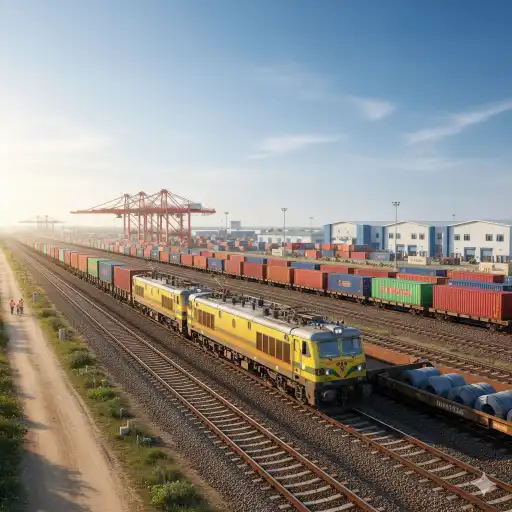The Indian Railways recorded a steady rise in freight activity, reporting a 2.3 percent year-on-year increase in total loading for October 2025 at 133.9 million tonnes. Freight earnings for the month hit an all-time high of ₹14,216.4 crore.

Officials attributed this to strong growth across multiple categories — pig iron and finished steel rose 18.4 percent, iron ore 4.8 percent, fertilizers 27.8 percent, containers 5.7 percent, and other goods 10.8 percent.
Coal loading fell 2.5 percent to 65.9 million tonnes in October but remained slightly higher for the current fiscal year at 462.8 million tonnes. Overall freight loading for the year so far stood at 935.1 million tonnes, up 3.1 percent, earning ₹1,00,920 crore for the national transporter.
A senior railway official said the growth in container and miscellaneous goods traffic showed that freight operations are becoming more diversified and less dependent on coal.
Scheduled Cargo Trains Improve Efficiency
To further boost performance, Indian Railways recently launched time-tabled, commodity-specific freight services aimed at connecting key production and consumption centres across northern India.
Among the new routes are the Annapurna Service from Ludhiana to Varanasi carrying food grains, the Gati-Vahan Service from Farrukhnagar to Lucknow for automobiles, the Niryaat Cargo Service from Garhi to Mundra Port for containers, and the Anantnag Cement Cargo Service from Roopnagar to Anantnag.
These dedicated cargo trains have cut travel times significantly — for instance, the Farrukhnagar-Lucknow route now takes just 28 hours, down from 70.
Officials said the services were developed after discussions with key stakeholders such as the Food Corporation of India, automobile manufacturers, and container train operators. Initially launched on a trial basis, these scheduled freight trains have now stabilized and are operating efficiently.
Container Services on Fixed Timetable
In another move to improve logistics reliability, Indian Railways has allowed selected container train operators to run on fixed schedules, ensuring faster and more predictable deliveries. Discussions are ongoing with private operators for a new export-import service linking the Tughlakabad Inland Container Depot in Delhi to Adani’s Mundra Port in Gujarat.
Additionally, a new service from Tughlakabad to Kolkata, operated by the Container Corporation of India (CONCOR), began on October 1, connecting major trade and industrial hubs along the Agra and Kanpur route.
The focus on scheduled, specialized cargo operations marks a clear shift toward efficiency, reliability, and better service standards in India’s freight transport network.
